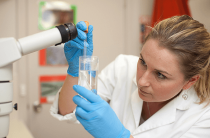Not so long ago, allergic diseases were quite rare. To date, doctors are increasingly diagnosing their patients with "Allergy". In order to notice the development of the disease in time, you need to know about its main signs. In this material, we will talk about water, its ability to cause allergies in humans, consider the specifics of treatment, and many other useful, important facts.
Risk factors
First you need to make sure that everything is in order with the immune system. It is required to remember whether, before the onset of an allergy, you had to use some potent drugs, suffer from serious diseases that have a negative effect on immunity, lowering it. The causes of water allergy can be a lack of immunoglobulin E, kidney disease, liver disease. By itself, water does not cause allergic reactions. The fault is the harmful components that make up its composition. The shade of white near the water means that the concentration of calcium salts is exceeded in it. In the presence of the aroma of the paint, you can sin on the content of phenol. So, consider the main types of allergies, their risk factors.
Main features
Most often, the disease manifests itself in the form of urticaria, rashes on various parts of the body, especially on the arms, neck, back and abdomen. Usually a rash appears in one specific area, then gradually develops, affects other areas of the skin. Also, the development of the disease may be indicated by hyperemia of the skin, mucous membranes, an allergic cough, which can become a risk factor, provoke asthma. You can’t start such a condition, you need to go to the hospital for the help of a doctor as soon as possible. Often, cough worries those patients who are allergic to chlorine.
It is important to know that in most cases, an allergic reaction that occurs to water does not manifest itself with signs such as anaphylactic shock, Quincke's edema.
But each person is individual, so there is still a probability of their occurrence, although it is quite small. Any suspicious symptom should be the reason for an immediate appeal to an allergist who will prescribe the necessary diagnostics and therapy.
Allergy to tap water
Water that flows through water pipes contains various impurities, bacteria that are harmful to the human body. This is especially true for fairly old pipes. Therefore, in this case, an allergy to water can easily disturb a person, significantly worsening his general well-being, manifesting itself as unpleasant symptoms. The human body may simply not perceive one or another type of bacteria, as evidenced by the presence of allergic symptoms.
It is not recommended to use tap water, because it contains a large amount of chlorine, which contributes to its purification. Try to remember what the main component is in all stain removers. Yes, it's chlorine. If you are not allergic to water, then after a certain period of time you may encounter problems such as deterioration of the teeth, disruption of the gastrointestinal tract, and thyroid gland. In addition to chlorine, fluorine is present in the leader. It is he who contributes to the appearance of such signs as the appearance of a small rash on the skin, black spots on the teeth. In case of prolonged contact with such water, the chances of problems with the nervous system, fragility of teeth and human bones increase.
Allergy to sea water
Allergy to water is quite rare. It doesn’t matter if it’s tap water or sea water, it’s still very rare to diagnose such an ailment. But, of course, you should always remember about it and try to prevent its occurrence. Often provocateurs of an allergic reaction are represented by bacteria contained in sea water. Increasingly, doctors are coming to the conclusion that allergies occur as a result of one particular type of water, all the rest do not have any negative effect on the body.
Basically, this type of water allergy is provoked by some marine plants, cold water, which is called "cold urticaria". The treatment measures here are quite simple - it is recommended not to swim in cold water and throughout the entire period of flowering plants. The symptoms of this disease are the same as with an allergy to tap water.
Allergic reaction to cold water
Anyone who has been diagnosed with an allergy to cold water must be very careful about their health during periods of cold weather and the onset of winter. Under such circumstances, the body begins to actively produce histamine, so the epithelial cells become much more sensitive. At risk are:
- boys and girls under 25;
- Small children;
- those men and women diagnosed with malignant tumors.
- people prone to this type of allergy, suffering from various serious diseases (for example, hepatitis, pneumonia, arthritis).
It is recommended to be very careful in contact with cold water for those who have disorders of the digestive system, liver, pancreas. The main symptoms of this type of water allergy are abdominal pain, nausea, swelling of the lips, throat, malaise, and severe dizziness.
Facts, recommendations
Usually, water allergy is diagnosed extremely rarely. For the first time such an anomalous phenomenon was registered in 1964. He was given the name "aquagenic urticaria." If suspicious symptoms occur, self-medication is prohibited. It is necessary to go to the hospital, undergo an examination, on the basis of which the doctor will be able to make the correct diagnosis, prescribe the appropriate treatment. To minimize the occurrence of allergies to water, other diseases on its background, it is recommended to stop drinking tap water.
Allergy to water: how to treat
When the diagnosis is already confirmed, first of all, the doctor must prescribe a complete restriction of contact with the allergen, that is, with water. The duration of any water procedures should not exceed 3 minutes. It is recommended to wash the dishes with special gloves, for drinking it is best to use purified water from a well or just purified water. In the house, you need to install filters to purify tap water in order to reduce the amount of various impurities that negatively affect the human body. Sometimes the symptoms of the disease disappear after about a few hours after interaction with the allergen.
Then you need to reduce contact with water. If, after preventing contact with water, the signs of an allergic reaction do not disappear, then the doctor will prescribe special anti-allergic drugs. These include ointments, oral tablets, gels, etc. At the present time, this type of allergy has not been fully explored, so it is not always possible to fully cure it. But you can significantly reduce the manifestation of negative symptoms.
Proper nutrition for allergies
Allergy to water, other types of the disease include adherence to a diet in which foods with a low level of allergenicity will be present. These include:
- lean meats (chicken, beef, veal, pork);
- all kinds of vegetables, greens (parsley, dill, cabbage, carrots, cucumbers, zucchini);
- cereals (buckwheat, oatmeal, barley, rice);
- fruits (green apples, pears, gooseberries);
- fermented milk products (cottage cheese, kefir, natural yogurt);
- bread (corn, buckwheat);
- dried fruits, compotes from them (for example, from apples, prunes, pears).
If a person is diagnosed with an allergy to water, products with a high level of allergenicity are prohibited. These include:
- fresh cow's milk;
- eggs;
- sausages;
- pickles, smoked meats;
- sauces, seasonings;
- honey and nuts;
- mushrooms;
- chocolate;
- semi-finished products;
- persimmon, pomegranate, melon, pineapple, cherry, raspberry, strawberry.
Any products containing preservatives, harmful additives, flavors, a large amount of fat are prohibited.
The diet should also be prescribed by a doctor. Therefore, at the first suspicion of an allergy, it is necessary to contact him, not to delay this process. Be healthy, take care of your health!















